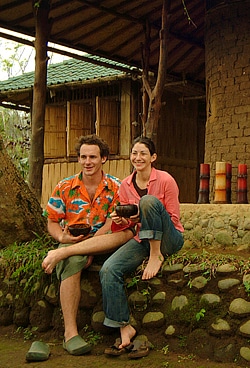How To Live On Bali
Twelve years ago, Ben Ripple won a poker game that changed his life. Too much lager led him to accept four hand- written airline travel passes instead of cash. So Ben and his new girlfriend, Blair, took off. After nearly six months of wandering, they wound up on Bali, and never left. Today, the couple runs Big Tree Farms, the island's largest organic farm. We caught up with the 30-something expats (and their daughters, 4-year-old Lila, who was born in the States, and 2-year-old Magnolia, who was born on Bali) in their teak house in Ubud.
How did you end up in Bali? When we landed in Bali, our first stop was a small village in the foothills of Mount Agung. Just after we arrived, we were whisked to a teeth-filing ceremony (believed to rid the body of vices) and immediately fell in love with both the magic and madness of the island. On the second day our host, Nyoman Kari, woke us at 4 a.m. and drove us to the top of a hill overlooking the Agung volcano and Sideman valley. Nyoman said his father had told him to give us this land because we needed to stay and build a farm. I have a degree in sustainable agriculture and had been working on organic farms since I was 16, so the idea didn't seem unreasonable. (We later learned that Nyoman's father had been dead for more than a decade.) So Bali, in this way, chose us, and we never looked back.
And now you are running the largest organic farm on Bali? A chance meeting with expat jeweler John Hardy led to a friendship and business deal to help teach young Balinese farmers the principles of "market gardening." As a result, our business grew from a quarter-acre patch that provided produce to island hotels. Today, it's a company focused on helping small farmers across the island organically grow and process artisan products like sea salt, rare spices, cashews, coconut palm sugar, cacao and honey. Today, we work with about 5,000 farmers on more than 1,000 acres and sell products in the United States, Canada, Europe, Japan and Australia.
Did it take some time to adjust to life on the island? Initially, it was the little things like fixed prices. Here, every transaction, no matter how small, requires negotiation. We also missed warm water for showers and washing dishes, sitdown toilets, quiet nights — the roosters, dogs and frogs have driven many a new arrival to tears. Most of all, our idea of personal space. The quirks have often become the things that make us smile most, and the one thing we've learned here more than anything else is simply to enjoy each moment as it comes — even if it comes extremely late, as is usually the case in Bali.
Describe a typical day.We all wake with the sun. Breakfast is local coffee or tea, and fresh fruits like mango, papaya, rambutan and snake-fruit. We drop off Lila at the sustainably built bamboo-and-earth Green School. Then it's off to the office or the jungle, where all our products are grown and processed. Evenings are often spent with friends enjoying fresh food and drink. Life is, simply put, a joy.
Sounds like a dream. Is there anything that's especially difficult? We return to see family at least once a year, and family visits Bali once a year. The initial concern from our families about our life in Bali has eased over the years, but being distant from the ones you love is the single hardest part about the tropical island fantasy.
Was it easy to join the community? It depends on who you ask. We largely escaped the legendary red tape of Indonesia. Asking too many questions is a must; often you don't get the right answer until you happen upon the right question. Things that look too good to be true usually are, and it's best to seek the advice of those with extensive island experience before making major decisions. Overall, the community is open and outgoing, and new friends are always welcome.
Do you have any advice for someone who wants to move to Bali? Experience the island for a significant period. See if it speaks to you. Visit both the mountains and the sea, as they have very different vibes. If when you get back home, you fi nd the urge to come back too strong to deny, you'll know you've been bitten by the Bali bug!
What's the best thing about Bali? It's the most incredible place I can imagine for raising our girls. They're growing up in one of the most magical play- grounds in the world. They love living under the coconuts in the rice paddies and vegetables fields of Bali. It's wild and raw and beautiful, and every day is a petting zoo gone wild with cows, goats, pigs and roaming hens trailed by chicks just about everywhere you look. And it's our favorite place too. We live in the mountains of Ubud. Think Eat, Pray, Love and you aren't far off.
Facts of Life
- Climate: Tropical
- Population of Bali: 3.2 million
- Population of Denpasar: 464,000
- Main hospital: Bali International Medical Center on the Jalan Bypass Ngurah Rai
- Price of local beer: 60 cents for a pint of Bintang at Naughty Nuri's Warung and Grill
- Languages: Bahasa Indonesia, English
- Ease of immigration: Difficult
- Ease of buying a home: Easy
- House starting price: $140,000 for a two-bedroom house in Ubud
- Website: baliproperty.com
